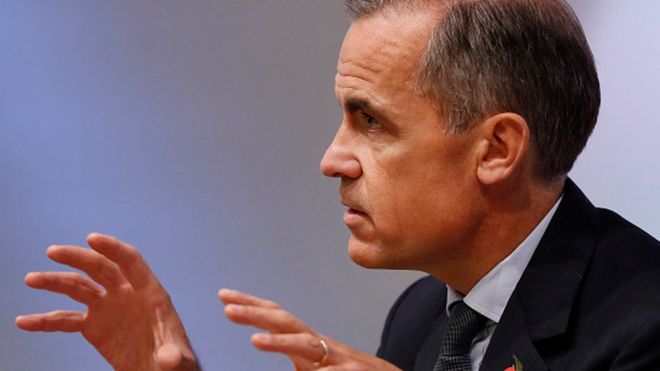
The outlook for UK financial stability after the Brexit vote "remains challenging" the Bank of England has said.
Stability is dependent on an orderly exit from the European Union, it said in a report.
The likelihood of risks to financial stability "remains elevated" as a result of the vote.
The report said it will take time to clarify the United Kingdom's new relationships with the European Union.
"The orderliness of the adjustment will influence the risk to financial stability," it added.
Otherwise the greatest risks to UK financial stability are slowing growth in China and the eurozone, the report said.
Banks in the UK provide more than half of debt and equity issuance by continental firms, and account for more than three quarters of foreign exchange and derivatives activity in the EU, it noted.

"If these UK-based firms have to adjust their activities in a short time frame, there could be a greater risk of disruption to services provided to the European real economy, some of which could spill back to the UK economy through trade and financial linkages," the Bank said.
However, the governor, Mark Carney, concluded that overall the financial system had proved resilient.
"The UK financial system has stood up well, dampening rather than amplifying volatility in financial markets," he said.
"Households and businesses have, as a result, been able to focus on what they should: whether a new home is right for their families or whether a new investment would help them better serve their clients."
Household debt
But the Bank also concluded that the outlook for the housing market was "highly uncertain".
It said household debt to income in the second quarter of 2016 was at 133%, which is "high by historical standards."
At 4.5 times average income, it pointed out that house prices were similarly high.

"If these households cut consumption sharply in order to service their debts, this may amplify any downturn in economic activity," the report said.
As a result the Bank has decided to leave its mortgage lending rules as they are.
"This will help ensure that underwriting standards don't slip from responsible to reckless as they have during past periods of consumption-led growth," said Mr Carney.
In June 2014 lenders were told they could not lend any more than 15% of their loan book to people borrowing more than 4.5 times their annual income - so-called riskier mortgages.
Lenders also have to apply an affordability test to anyone wanting to take out a mortgage.
As part of that, lenders have to assess whether a home-owner could still afford the mortgage if interest rates rose by 3% at any time in the first five years of their loan.
The Bank said it would also continue to monitor the buy-to-let market, an area it has previously been concerned about.
While buy-to-let transactions have slowed in recent months, it said there was no evidence of a widespread sell-off by investors.
No comments:
Post a Comment